N.P. : The Hun
Sen family is major shareholder of the firm Electricité Du Cambodge.
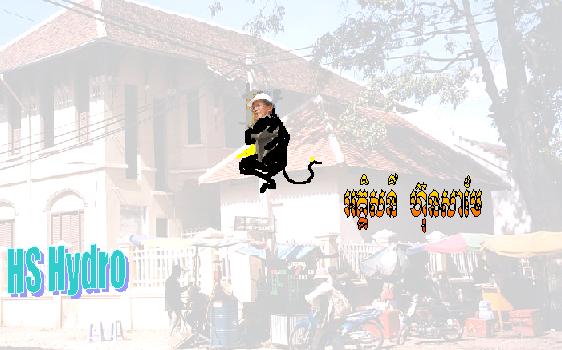
| RENCONTRER DIEU |
COURRI@L 2005 | MEET WITH GOD |
Germany pledges funds to upgrade Cambodia's electricity grid
(2005-Sep-11)
PHNOM PENH, Cambodia (AP) - The German government announced
Friday it had pledged 12.17 million E (US$15.2
million) to build an electricity grid connecting two provincial
towns in Cambodia. The grant will be used to build a 65-kilometer (40-mile)
power line between the southern towns of Takeo and Kampot,
upgrade substations and train local technicians, the German embassy said
in a statement. Power generation in Cambodia remains largely undeveloped.
Only 15 percent of the impoverished country's households have electricity,
the Ministry of Industry, Mines and Energy says. Electricity supply is
concentrated mostly in the capital Phnom Penh and larger provincial towns.
Power prices in Cambodia are among the highest in Southeast Asia, and a
major source of complaints by foreign and local investors. The embassy
said the project's main goal is to extend power supplies in Cambodia's
south to allow electricity to be imported from neighboring Vietnam, where
prices are lower. A decrease in costs will allow for expansion of electricity
access, which will bring in more companies and jobs, it said.
N.P. : The Hun
Sen family is major shareholder of the firm Electricité Du Cambodge.

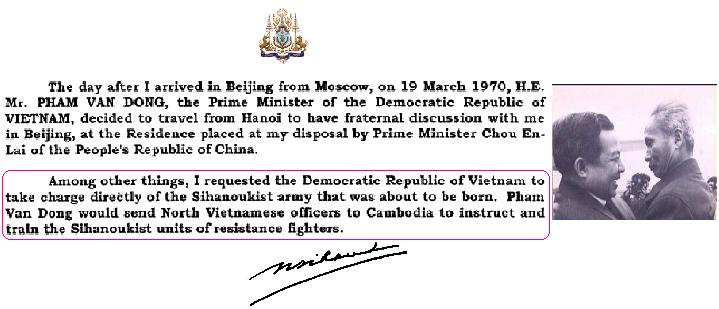
KL : During the 1970-1975 war, I heard by military radio setpost usually used by the military, conversations in Vietnamese between bodois in operation in Cambodia. That proved there were Vietcong/North Vietnamese soldiers operating in our country.
N.P. : The most outrageous was that right from the month of April 1970 the battle had started between Lon Nol army and VC-NVN troops. There were yet no KR soldier, no Sihanoukist soldier. Lon Nol had complained to the UN Security Council but no country did care. Why? Because Sihanouk had already created his damned FUNK and GRUNK. Thus the UN said it was a civil war for power, not a foreign invasion! Damned you, Sihanouk!
La culpabilité de Norodom Sihanouk (2005-Sep-03)
Norodom Sihanouk, bien qu’abdiqué, continue encore, notamment par
fax du 18 août 2005, à vider sa colère, sa rancœur
et ses rancunes sur les citoyens cambodgiens qui ont critiqué ses
déboires et ses fautes génératrices des malheurs répétés
et persistants au Cambodge.
C’est pour rétablir la vérité, toute la vérité
et rien que la vérité (qu’il déforme sciemment), que
ce nombre croissant de personnalités et de personnes (sic) sur lesquelles
il déverse sa haine, lui répond à présent :
A vrai dire, nous, ses victimes, n’avons plus de ressentiments contre ceux
qui ont précipité notre pays dans son actuel déclin.
Nous voulons simplement en tirer des leçons pour que les mêmes
fautes ne se reproduisent plus jamais et, ce faisant, sommes obligés
de les expliciter (dans un contexte historique incontestable) pour qu’elles
servent d’enseignement pour l’avenir.
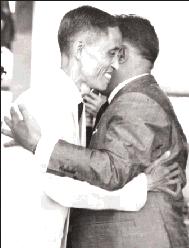
Sihanouk recevant en 1965 l'émissaire vietcong Tran Bu Kiem. |
Quand les deux Vietnams commençaient à se battre dans les
années 1960, nous avons voulu nous tenir à l’écart
de ce conflit qui nous est tout à fait étranger et nos deux
généraux ont traduit ce sentiment en lui disant que nous
n’avons pas à prendre le parti de l’un contre l’autre des deux belligérants.
Mais N. Sihanouk alors Chef de l’Etat leur intima l’ordre de suivre sa
haute politique (sic) qui consistait secrètement à
admettre l’implantation des Nord-Vietnamiens et Vietcongs (supplétifs
des Nord-Vietnamiens au Sud) sur nos frontières orientales et à
les ravitailler en vivres et armements, ouvrant ainsi un autre front sur
notre territoire, bien que Sihanouk continuât à se réclamer
de sa neutralité.
Mais, comme le secret ne pouvait être longtemps soustrait à la vigilance de la CIC (commission internationale de contrôle de l’armistice instituée par la conférence de Genève de 1954 pour s’assurer du retrait total des NVN et VC du territoire cambodgien, commission composée de l’Inde, de la Pologne et du Canada), N. Sihanouk mit fin à la mission de la CIC le 9 Octobre 1969 et lui intima l’ordre de rapatrier tout son personnel avant le 31 décembre de cette même année. En conséquence de quoi, la zone frontalière de l’Est cambodgien était largement ouverte aux NVN et VC, sans qu’aucune Institution internationale ne pût témoigner valablement de son état. Les administrateurs et députés en charge de la région ne pouvaient s’y rendre sans essuyer des coups de feu de semonce. Des incidents frontaliers s’aggravaient de plus en plus à tel point que N. Sihanouk lui-même, en quittant Phnom-Penh le 6 janvier 1970, a déclaré vouloir demander à l’URSS et à la Chine d’arrêter les méfaits de leurs protégés au Cambodge. |
| Quand on sait que dans le passé : le 19 août 1968, à la radio de Kompong Thom, le même Sihanouk avouait avoir fait exécuter un millier de Khmers Rouges sans aucun regret (et même il s’en félicitait), la menace ne serait pas gratuite ; les Khmers bleus (selon son vocabulaire, qui ne sont pas rouges) n’échappaient pas non plus à cette sanction suprême ; ils ont cependant l’insigne honneur d’être officiellement filmés au moment de leur exécution ; et, pendant un mois, les cinémas de la capitale en ont eu - selon son ordre - la primeur à titre d’actualités locales. C’est à partir de ce moment là que le divorce est consommé entre le Chef de l’Etat et les gouvernants de Phnom Penh et que Sihanouk a signé sa propre destitution sans le savoir. |
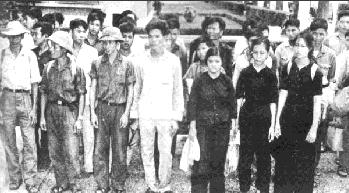
Prisonniers vietcongs et nord-vietnamiens libérés sur l'ordre de Sihanouk, le 29 juillet 1969. |
Paris, le 30 août 2005
Collectif des « Khmers républicains » et « Progéniture
des vaincus du 17 avril 1975 »
Former Shell employees asking for interest on retirement pay
(2005-Aug-30)
By Vong Sokheng in Phnom Penh Post : Former employees of Shell
oil company are demanding $1 million in interest on retirement benefits
recently awarded to Cambodia staff members who worked for the company before
1975. The staff of Societe Shell du Cambodge (SSC) were forced to stop
working when the country was overtaken by the Khmer Rouge in 1975.
In November 2001 SSC's modern-day equivalent, Shell International Limited,
paid retirement benefits totaling $250,000 to 38 former employees, said
Bun Khem, one of the claimants. A further $109,710 was paid in March last
year to cover long-overdue retirement benefits owed to 35 other former
staff. Now the 73 former employees are demanding that Shell's London-based
operations pay 10 percent interest on their retirement benefits,
Khem said. "According to the legal basis, the company has to pay 10
percent as an interest rate of the retirement benefits, which the
company was not able to pay after 1975," Khem said. "I think that
the SSC has tried to cheat our money." He estimated the interest owed
between 1975 and 2003 was about $1 million. The action comes in response
to a similar claim in Vietnam in which
Royal Dutch-Shell Group of Companies paid $2 million to nearly 600 Vietnamese
workers who lost their jobs without severance pay when the oil company's
Vietnam operations were taken by the communist government.
"Our case is similar to the one already applied in Vietnam, and the
same legal basis of operating should clearly consist of interest [paid
on retirement funds]," Khem said. The Cambodian claimants tried to
push their request through the British Ambassador in September last year,
but were unsuccessful, Khem said. Robert Pritt, senior legal counsel of
the Shell company in London, did not reply to e-mails.
|
Les
[2005-août-24] |
 |
| Contre la sécheresse, changer de grains (2005-août-21)
1000 familles dans le district de Romeas Hèk, Svay Rieng, ont reçu des grains de maïs et des pousses de patate. Sur les 16 communes du district, la pluie est tombée inégalement : 6 (moyennement), 6 (peu), 4 (très peu). M. Thach Ratana, chef du bureau d'Agriculture de Svay Rieng a déclaré : "Nous devons lutter ensemble contre la pauvreté en changeant de cultures. En ces temps-ci les pluies tombent très peu et nous avons tout juste de l'humidité, la culture du riz est donc impossible. Nous sommes déjà au milieu de la saison des pluies ; pour assurer la sécurité de la nourriture, nous devons changer pour la culture du maïs et des patates." M. Ratana espère qu'il y aura suffisamment de pluie en septembre et son bureau a encore une réserve de semences. Il appelle aux paysans d'aménager une zone commune de semences plus facile à irriguer en creusant un puits de secours. |

Photo Koh Santepheap |
No separation of powers in Cambodia (2005-Aug-11)
CAMBODIAN JUDICIARY HAS A LONG WAY TO GO
Opposition parliamentarians note with dismay that there is still a long
way for the Cambodian judiciary system to be impartial and independent
despite all the international community’s effort up to now to improve it.
The whole government system is so much politicised that it will need a
different way to make any difference to the application of the doctrine
of the separation of powers in Cambodia.
What the court procedures publicly displayed within the last ten days should
compel a critical evaluation of the effort to assist the judiciary system
in this country. Reasonable observers will find it most difficult to justify
the manner in which the court convicted Opposition MP Cheam Channy,
Opposition member Khom Piseth, and the accused in the murder of union leader
Chea Vichea. If the existing court system is willing to treat the high
profile cases with such contempt, there is not much hope for ordinary cases;
they are vulnerable to manipulation at will, politically or otherwise,
beyond any stretch of imagination. The court procedure has already cast
further doubt on the credibility of the upcoming
trial of the Khmer Rouge leaders.
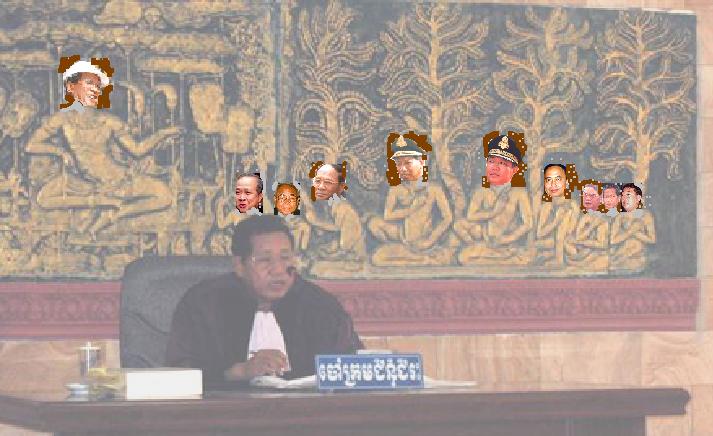
The Opposition parliamentarians invite all sectors of the international
community, especially those who have been involved in the Cambodian judiciary
system, to consider a possibility that whatever they have been doing up
to now is not working the way it should. Of course, Rome was not built
in a day, but had the basic foundation for greatness not been accepted
from the start, Rome would not be standing proud today. The Opposition
parliamentarians believe there must be a different way to effectively apply
the doctrine of the separation of powers in Cambodia. The main challenge
is if we all really want it.
The SRP Parliamentarians
|
|
|
( PREVIOUS ) |
|
|
|
|
|
|
|
|
|
|